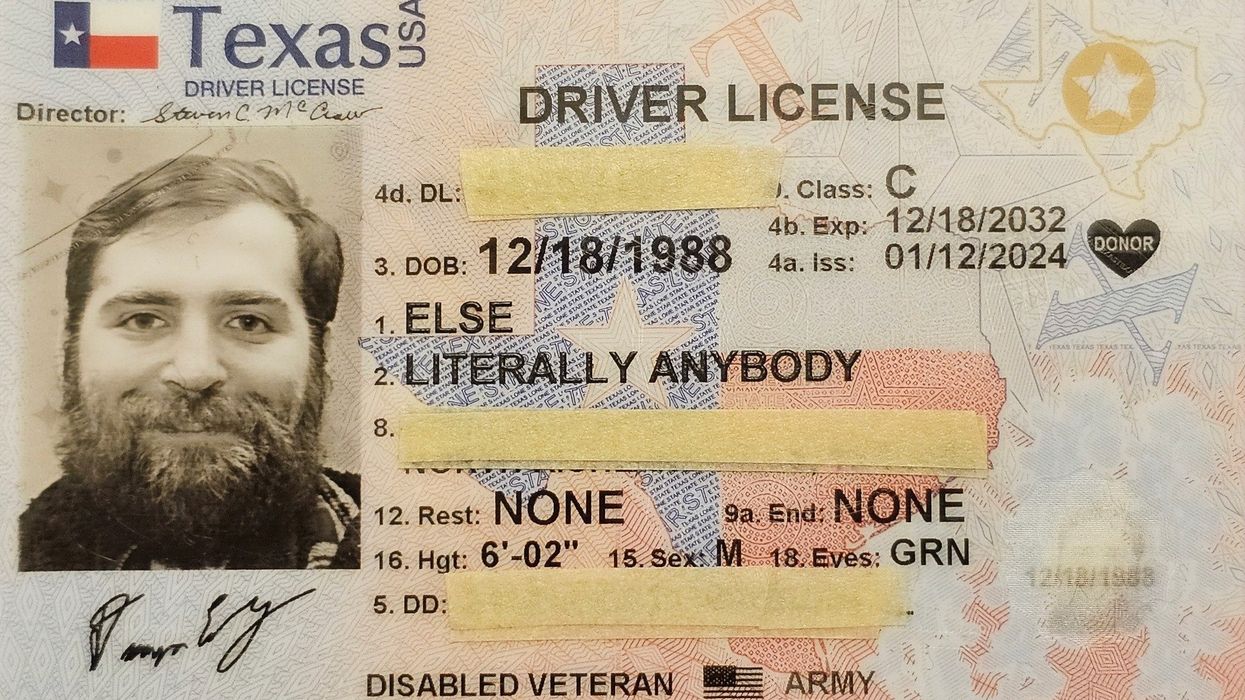Schmidt is a syndicated columnist and editorial board member with the St. Louis Post-Dispatch.
The dislike for the candidates at the top of both parties’ tickets is so unpalatable, “Literally Anybody Else” might be coming to a ballot near you. While the dissatisfaction with the race is palpable, the basis for the disappointment in the candidates could not be more different.
Dustin Ebey, a 35-year-old U.S. Army veteran and seventh grade math teacher in the Dallas suburbs, legally changed his name to Literally Anybody Else and is running for president of the United States to prove this point.
The Texas man says he believes anybody else should be president instead of the Democratic and GOP frontrunners. "America should not be stuck choosing between the 'King of Debt' (his self-declaration) and an 81-year old. Literally Anybody Else isn't a person, it's a rally cry," Else's campaign website stated before being updated, according to
Else told a Dallas news outlet that his campaign wasn't about sending him to the White House; rather, he said he wanted to give voters a chance to express their unhappiness with Trump's and Biden's candidacies. "People are voting for the lesser of two evils, not someone they actually believe in or support. People should have the option to vote for someone who resembles and represents them, not the lesser of two evils. I reject that,” he said.
Both candidates are disliked by a majority of Americans. A YouGov-University of Massachusetts Amherst poll conducted in January showed that 45 percent of Americans believe a Biden-Trump rematch is bad for the country.
In a ABC-Ipsos survey, 36 percent of Americans said they trust Trump to do a better job leading the country as president, while 33 percent trust Biden more – and 30 percent trust neither.
A New York Times-Siena College poll from March found that 19 percent of voters disapproved of both men, but Biden is slightly less hated, with a spread of 7 points between them (45 percent to 38 percent).
The voters reflected in these surveys have been labeled “double haters” and they make up as much as one-fifth of likely voters according to various polls. This group is likely to decide the 2024 election.
Judith Smith, from Moncks Corner, S.C., discussed the choice between Trump and Biden with The Guardian. “That’s like choosing between a hedgehog and a porcupine,” she said.
I disagree with Smith here and would suggest changing the analogy from animals to fruit. It is like choosing between an overripe, mealy apple and an orange that is completely rotten and you don’t really want to eat either.
Since we live in a hyper-partisan world, the percentage of the electorate who will not vote party line has been shrinking. Those voters who are up for grabs, including the “double haters,” should consider weighing both the character and policy proposals of each, while being mindful of the fallacy of moral equivalence. This fallacy occurs when one suggests that two morally different actions are equivalent, simply because they share some similarities. This is no easy task for responsible citizens as they consider the characteristics and qualifications of any candidate before Election Day.
While neither man is popular, it seems too easy to fall into the moral equivalency trap and to compare them as if they were the same.
Trump incited an insurrection and is an adjudicated rapist. He faces 91 felony counts after being indicted four times within the last year. He is accused in Georgia and Washington, D.C., of plotting to overturn his 2020 election loss to Biden. He is also accused in Florida of mishandling classified documents, and in Manhattan of falsifying business records stemming from hush money payments, made during his 2016 campaign, to a pornographic film actress.
Biden, on the other hand, is an octogenarian who many feel is not at the top of his game and has an even more unpopular running mate. He is trying to hold together a fragile coalition that stems from progressives to the left of him and soft Republicans to his right. He struggles to make any one faction in his alliance particularly happy. One has to look no further than Biden’s tightrope walk on foreign policy, specifically the Israel-Hamas war or securing our southern border.
Literally Nobody Else is not likely to gain ballot access, and therefore the double haters like him will need to go back and make the choice between not voting, voting for a third-party candidate, or judging Biden and Trump on their merits and which of the two “represents” them more.




















Trump & Hegseth gave Mark Kelly a huge 2028 gift